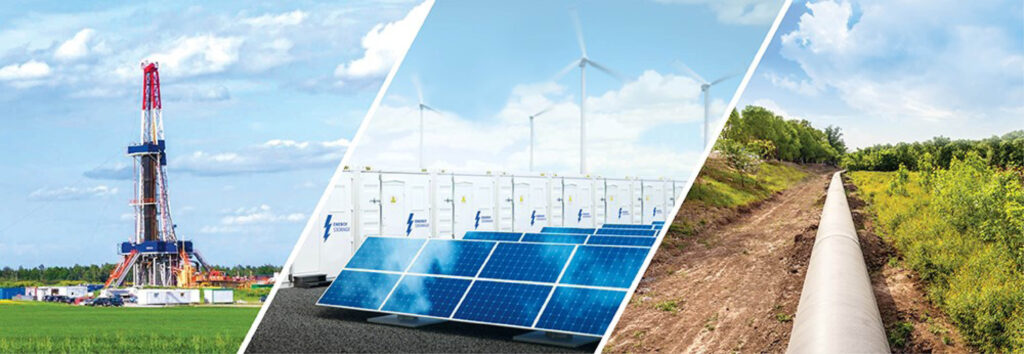
Babst Calland’s Energy and Natural Resources Practice Group represents energy companies across the country on a variety of matters. Energy clients receive support from our highly focused, multidisciplinary team of energy attorneys that provides a wide range of legal services to clients engaged in the coal, mining, oil and gas, and renewable energy industries.
Babst Calland’s energy attorneys work collaboratively with in-house counsel, executives, and outside advisors to provide timely and cost-effective legal strategy and representation. Our energy clients come to us for our decades of experience on environmental, pipeline and hazardous materials safety, construction, litigation, energy title, transactions, real estate, land use and zoning, emerging technologies, and employment and labor matters.
Babst Calland represents energy companies across the country. We understand each geographic footprint and tailor legal strategies accordingly, with a deep knowledge of state regulation and local jurisdictions. Our attorneys are key advisors on a myriad of issues related to transactions, due diligence, state and federal regulatory matters, local government challenges, lease disputes, royalty interest determinations, and title examination.
As one of the nation’s most respected energy law firms, Babst Calland is a legal and regulatory resource for renewables clients nationwide. Our renewables clients benefit from the firm’s decades of experience throughout the energy space. Our attorneys take a proactive approach, helping clients achieve their business and sustainability objectives while minimizing risk. Our experience allows us to guide your business to maximize opportunities and overcome challenges of the complex and ever-changing patchwork of federal, state, and local incentives and restrictions related to renewables.
Our energy clients are the beneficiaries of Babst Calland’s strong, seasoned, and diverse legal team with the necessary experience to provide well-planned strategy to pre-empt or react to whatever challenges lie ahead, whether the issues revolve around coal, mining, oil or natural gas production, midstream or pipeline operations, renewable project siting, petrochemical processing or petroleum refining, or best business practices applying environmental and energy law and regulations.
POWERING THE FUTURE: How Our Region Can Lead America’s Data Center Development
VideoThe surge in artificial intelligence is driving a rapid increase in demand for data centers and their significant power needs, creating challenges for businesses in securing adequate power and land. …
POWERING THE FUTURE: How Our Region Can Lead America’s Data Center Development
Pittsburgh Business Times
(by Moore Capito featuring Matt Smith)
With the surge of artificial intelligence, the demand for data centers to support that computing power is growing fast. …
EQB Tables Petition for Study to Increase Required Minimum Setbacks from Unconventional Oil and Gas Wells
The Foundation Mineral and Energy Law Newsletter
Pennsylvania – Oil & Gas
(by Joe Reinhart, Sean McGovern, Matt Wood and Alex Graf)
On April 8, 2025, the Pennsylvania Environmental Quality Board (EQB) tabled consideration of the Clean Air Council (CAC) and Environmental Integrity Project’s (EIP) petition for a rulemaking seeking to amend 25 Pa. …
PADEP to Rescind and Revise Water Supply Replacement Technical Guidance Documents Due to Changes to Coal and Noncoal Regulations
The Foundation Mineral and Energy Law Newsletter
Pennsylvania – Mining
(by Joe Reinhart, Sean McGovern, Christina Puhnaty and Ethan Johnson)
In a February 25, 2025, Mining and Reclamation Advisory Board and Aggregate Advisory Board Joint Regulation, Legislation, and Technical Committee Meeting, the Pennsylvania Department of Environmental Protection (PADEP) presented its plans to rescind two technical guidance documents (TGDs) and revise two others due to the TGDs being inaccurate and out of date after changes to Pennsylvania’s coal regulations and noncoal regulations. …
Data Centers and Our Region
West Virginia Executive
(by Moore Capito)
As the “backbone” of digital infrastructure, data centers are becoming more and more critical in meeting the demands of the modern digital world. …
Emerging Technologies and the Energy Industry
There’s no doubt that the energy sector has seen a recent surge in tech-driven initiatives. As economic pressures continue to drive companies to develop and deploy advanced technologies, the industry must also navigate the complex landscape of technology innovation and sustainability to continue to meet regulatory requirements, protect intellectual property, and manage risks associated with the rapidly changing legal and market conditions. …
Data Centers and Our Region
OnRAMP Magazine
(by Moore Capito and Justine Kasznica)
Data center is fast becoming a household term. …
Treasury Department Suspends Enforcement of Corporate Transparency Act’s BOI Reporting Requirements
Firm Alert
(by Chris Farmakis, Susanna Bagdasarova, Kate Cooper, and Dane Fennell)
In yet another twist in the ongoing roller coaster ride of Corporate Transparency Act (CTA) compliance, the U.S. …
DEP Announces Availability of Draft Technical Guidance for Maintaining Freeboard and Dewatering of Well Development Impoundments for Unconventional Oil and Gas Operations
The Foundation Water Law Newsletter
(by Lisa M. Bruderly, Jessica Deyoe and Mackenzie Moyer)
On January 4, 2025, the Pennsylvania Department of Environmental Protection (DEP) announced the availability of draft Technical Guidance for Maintaining Freeboard and Dewatering of Well Development Impoundments for Unconventional Oil and Gas Operations (Draft Guidance). …




